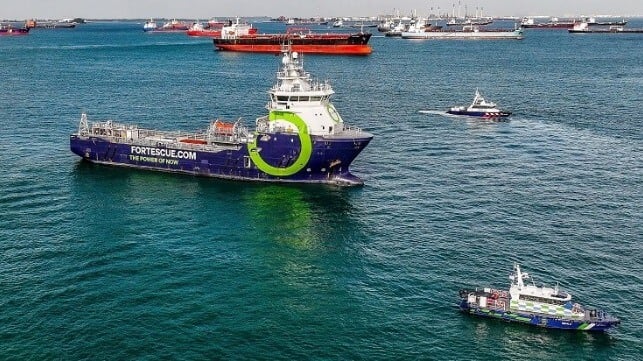In what may be a pivotal moment in the future of alternative marine fuels, the world’s first bunkering of ammonia and tests of adapted engines took place in Singapore aboard an offshore supply vessel retrofitted by Australia’s Fortescue Group. The testing is ongoing helping to develop the information on safety and management that might one day see ammonia become one of the leading marine fuels.

The tests were carried out with the Fortescue Green Pioneer, a 3,100 dwt vessel built in 2010 in Indonesia. Fortescue Future Industries acquired the now 14-year-old supply ship MMA Leveque early in 2022 from Australia-based MMA Offshore. It was originally outfitted with four diesel-electric Cummins main engines.
Fortescue began in 2022 testing the conversion of a four-stroke engine to run on ammonia in combination with diesel as its pilot fuel. The tests took place at the company’s facility in Perth, Australia, and in July 2023 the conversion work on the vessel began at Seatrium’s Benoi yard. Two of the vessel’s four engines were enabled to use ammonia in the process which included the installation of the gas fuel delivery system, safety systems, and the infrastructure to support the operations.
The vessel was previewed at the COP28 conference when the company’s flamboyant founder and chairman Andrew Forrest arrived in Dubai aboard the Fortescue Green Pioneer. He called for the world’s ports to prepare and develop the infrastructure for ammonia as a marine fuel. The ship was not able to sail on ammonia he said because no port was ready.
The Maritime and Port Authority of Singapore worked with partners including DNV and fuel supplier Vopak. They report since October 2023 they have been conducting workshops to study the hazards and safety protocols. They also developed processes for the mitigation methods and monitoring due to the highly toxic nature of ammonia. Furthermore, they developed training protocols for the handling of ammonia.
“The safe conduct of this fuel trial supports the holistic assessment of the use of ammonia as a marine fuel, and the development of standards and safety procedures,” said Teo Eng Dih, Chief Executive of the MPA. “This will inform the crew training, emergency, and bunkering procedures which MPA, agencies, and the tripartite community are developing in support of making available safe and cost-efficient solutions as MaritimeSG and the international shipping community undergo the energy transition.”
The first bunkering involved three tonnes of liquid ammonia loaded from Vopak’s Banyan Terminal on Jurong Island in Singapore. According to the MPA, as part of the risk management, extensive pre-operations, safety checks, and tests were conducted. They highlight that the fueling was completed with the existing infrastructure demonstrating the industry’s ability to adapt to ammonia as a marine fuel in the future.
The fuel trial was conducted over a period of seven weeks. It included rigorous testing of the vessel’s storage systems for ammonia, as well as the associated piping, gas fuel delivery system, retrofitted engines, and the overall seaworthiness of the Fortescue Green Pioneer. The vessel is registered in Singapore and earned a gas fuel ammonia notation.
The testing and demonstrations are ongoing. A second bunkering of a further three tonnes of liquid ammonia will be loaded for the Fortescue Green Pioneer in the next few weeks. Further tests and trials are planned as the validation process continues.